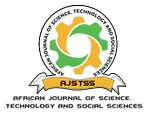Influence of Rhizobium inoculation and phosphate rock fertilizer application on growth and yield components of green gram in Tharaka-Nithi county, Kenya
DOI:
https://doi.org/10.58506/ajstss.v1i1.32Keywords:
Low green-gram production, Rhizobium inoculation, phosphate rock application, ; green gram yield improvement.Abstract
Green gram is an important drought tolerant grain legume crop in Kenya. In Tharaka Nithi County green gram is as a major source of food security. Hence, there is need for a cheap and sustainable system of agricultural production is needed to increase its production. The legume/Rhizobium symbiosis in combination with phosphate rock offers a natural system for improving green gram nitrogen fixation. Therefore, this study was aimed at determining the effect of Rhizobium and phosphate rock fertilizer application on growth and yield attributes of N26 and KS20 varieties. The study was carried out at Chuka University Horticultural Research Farm for two seasons, November 2019 to January 2020 and February to April 2020. Factorial experiment of 2x2x2 was laid out in a Randomized Complete Block Design (RCBD). There were three factors, variety (N26 and KS20), phosphate rock (0 and 30 kg P ha-1) and Rhizobium MEA 716 (0 and 100 g ha-1). The experiment contained eight treatments which were replicated three times. The data was collected fortnightly on four randomly selected plants on parameters such as plant height, number of leaves, branches, pods, total dry biomass, shoot and root dry weight and grain yield. These data were analyzed using Statistical Analysis Software (SAS). Significant means are separated using Least Significant Difference (LSD) at probability level of 5%. Results for both seasons indicated that combined application of Rhizobium MEA 716 Rhizobium 100 g ha-1 and phosphate rock 30 Kg ha-1 phosphate under variety in treatment (R1P1KS20) showed significantly (P<0.05) higher plant height (76.07 cm), number of branches (14.08 plant-1), shoot dry biomass (52.01 g plant-1), root dry biomass (7.60 g plant-1), total dry biomass (146.4 g plant-1), number of pods (84 plant-1) and yield (2158 kg ha-1) compared to variety N26 in treatment (R1P1N26). Therefore, combination of Rhizobium MEA 716 100 g ha-1 and phosphate rock 30 Kg ha-1 under variety KS20 led to improved growth attributes equally yield components of KS20 variety over N26. From these findings, application of Rhizobium MEA716 at 100 g ha-1, and 30 Kg ha -1 phosphate rock under variety KS20 was recommended for improved and a sustainable green gram production in the study area.


